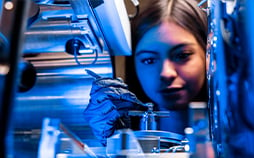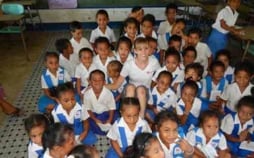You Can Just Change the World!
Donations helped Michelle Arias see possibilities she’d never imagined before.
Change people's lives at home and around the world
February 2018
“I don’t know if I can!” Andrea Kokkonen shouts, a look of excited anticipation on her face. A smile forms as she pulls her fishing rod up and a large halibut splashes above the cold Alaskan water. As her team hoists the convulsing fish into the boat, Kokkonen pushes her hat back and finally breathes a sigh of relief. Just another day in biology class.
Kokkonen and several other BYU students in the College of Life Sciences were able to travel to Alaska this past summer—funded through the Inspiring Learning Initiative—with Professor Mark Belk to Pybus Point Lodge. Belk’s team is researching the effects of climate change looking at otoliths, a dime-sized bone found in rockfish. Just as tree rings provide an annual weather record, otolith rings catalogue ocean temperatures, changes in the food chain, and evidence of nuclear events across their lifespan (which can be up to 200 years).
For Belk, bringing students into the field has been crucial to his research. Referring to the long-term causes of climate change, he says, “You get the most frustrated when you think, ‘This makes me mad and I can’t do anything about it.’ And the only redemption from that is to think, ‘But I can do something about it.’ I can teach students, and [through their efforts] things will change through time.”
While in Alaska, student Peter Searle said, “You can only learn so much in the classroom, but here, we’re actually getting our hands dirty.” Fellow student Samantha Tilden added, “I think fieldwork is super exciting, getting to be out here in nature, and I think we can make a big difference.” This coming summer Professor Belk plans to return to Alaska with a new group of students to continue fishing for answers.

Donations helped Michelle Arias see possibilities she’d never imagined before.

A team of healthcare professionals and BYU students traveled to Samoa to help children and families understand a deadly illness: rheumatic heart disease. Amid beautiful people and a tropical paradise, the students learned and taught lessons that forever changed their lives.

For Sarah Johns, a 2L student from Huntington Beach, California, attending law school and participating in competitions has improved both her knowledge and her spirituality.